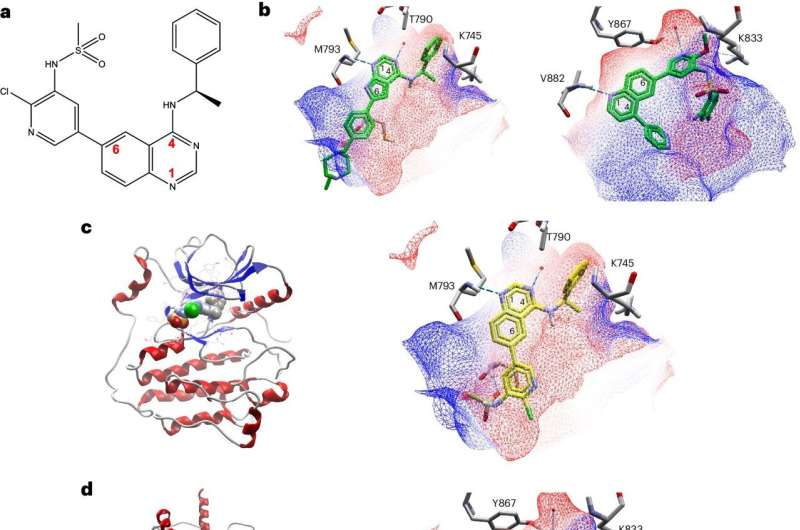This article has been reviewed according to Science X's editorial process and policies. Editors have highlighted the following attributes while ensuring the content's credibility:
fact-checked
peer-reviewed publication
trusted source
proofread
New drug candidate blocks resistance to cancer therapies

A team of researchers at the University of Michigan Health Rogel Cancer Center has designed a molecule that impairs signaling mediated by two key drivers of cancer therapy resistance. The design and preclinical evaluation of the inhibitor, MTX-531, was published in Nature Cancer.
Researchers, led by Judith Sebolt-Leopold, Ph.D., discovered MTX-531, a kinase inhibitor with the ability to selectively block both epidermal growth factor receptor (EGFR) and phosphatidylinositol 3-OH kinase (PI3K).
"By dual targeting of EGFR and PI3K, MTX-531 acts to shut down the escape mechanisms that tumors use to resist treatment. In certain cancers, such as head and neck squamous cell carcinomas, each of these kinases is known to mediate resistance to inhibition of the other," said Sebolt-Leopold, research professor of radiology and pharmacology at Michigan Medicine and co-leader of Rogel's developmental therapeutics program."
The study shows that in mouse models, MTX-531 led to tumor regressions in multiple head and neck cancer models and was well-tolerated. Furthermore, MTX-531, in combination with drugs targeting the RAS pathway, was shown to be highly effective against KRAS-mutated gastrointestinal tumors originating in the colon or pancreas.
Other PI3K inhibitors are associated with hyperglycemia, which can be severe enough that treatment must be stopped. MTX-531 does not lead to this side effect, indicating it could become a less-toxic treatment option.
The innovative design of MTX-531 was achieved through a computational chemistry approach, led by Sebolt-Leopold and Christopher Whitehead, Ph.D., a former member of the Leopold laboratory team, and currently chief operating officer of MEKanistic Therapeutics, Inc. The teamwork of Whitehead and Sebolt-Leopold began more than 20 years ago when both scientists collaborated on Pfizer's MEK inhibitor program.
Sebolt-Leopold says that MTX-531 is a demonstration of their continued commitment to advancing cancer research by discovering and advancing first-in-class therapeutics.
"In drug company laboratories, one often does not have the opportunity to model clinical applications of lead candidates in detail," said Sebolt-Leopold. "At Michigan Medicine, I have the unique opportunity to extend my research on molecular targeted agents to a more translational level."
Advanced development activities are underway to support the clinical evaluation of MTX-531. Researchers are hopeful that these studies will ultimately lead to initiation of clinical trials in patients.
Additional authors are Christopher Whitehead, Elizabeth Ziemke, Christy Frankowski-McGregor, Rachel Mumby, June Chung, Jinju Li, Nathaniel Osher, Oluwadara Coker, Veerabhadran Baladandayuthapani, Scott Kopetz, and Judith Sebolt-Leopold.
More information: Christopher E. Whitehead et al, A first-in-class selective inhibitor of EGFR and PI3K offers a single-molecule approach to targeting adaptive resistance, Nature Cancer (2024). DOI: 10.1038/s43018-024-00781-6



















